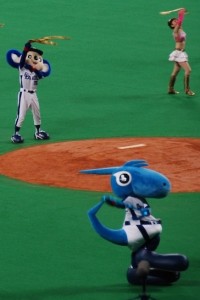
The Phillies have their Phanatic, San Diego has a famous chicken, and the Mets have a guy with a giant baseball for a head. But in Japan, each team has a family of mascots. A lot of them are birds; most of them are . . . just . . . strange.
The dragons of the Chunichi Dragons look like pink and blue aliens, and the team’s main mascot is a koala named Doala. After the Nagoya zoo received koalas in 1984, the hometown team adopted the marsupial as one of its mascots. Doala has a man’s body and a giant – and cute – koala head. Japanese women find Doala sexy, and I find that slightly creepy.
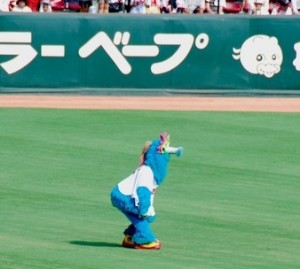
An unofficial poll of a handful of Japanese baseball fans indicates that after beer girls (technically not considered mascots), the fans’ favorite is Slyly of the Hiroshima Carp. Despite the team name, Slyly isn’t a fish; he’s a . . . thing. Most people (i.e., Americans) would take one look at Slyly and say, “Phanatic rip off.” Others prefer to say that Slyly was inspired by the iconic mass of green weirdness that has entertained the Philadelphia Phillies faithful (or would that be Phaithful?) since 1978. And isn’t imitation the greatest form of flattery? Truth be told, Slyly and the Phillie Phanatic were designed by the same company, Acme Mascots, Inc. So, that makes them, like, cousins, right?
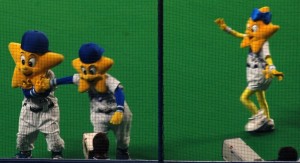
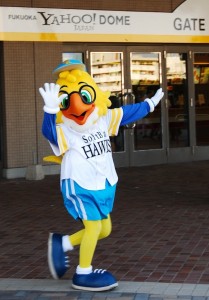
The Yakult Swallows, Rakuten Golden Eagles, SoftBank Hawks, and Chiba Lotte Marines have large flocks of birds to represent them. There are eight Hawks, the most for one team in Nippon Professional Baseball. Unlike the menacing Tiger on Hanshin’s logo, the mascots are cute and cuddly. Giabbit, an orange rabbit whose head resembles the interlocking YG of the team’s logo, cheers on the Yomiuri Giants. The Orix Buffaloes don’t have buffaloes, but Nippie and Ripsea, a boy and a girl who have immense hair. The Yokohama BayStars mascots wear bulky yellow stars on their heads. Fighty, a pink pterodactyl formerly of the Nippon-Ham Fighters, retired when the Fighters moved from Tokyo to Hokkaido. The dinosaur was replaced by B.B. (Brisky the Bear) and Cubby. All mascots in Japan have the requisite oversized feet.
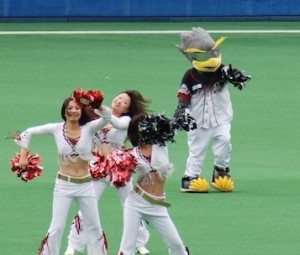
These mascots are the hardest working good luck charms in the business. They’re active before, during, and after games, spreading happiness to the rabid Japanese baseball fans. They perform complex pompom routines with the cheerleaders and lead the crowd in the team’s fight song.
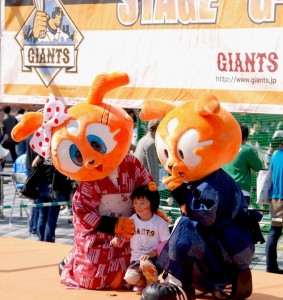
Not simply there to pump up the crowd with silly antics and comedy routines – although there is plenty of that – they also serve as what I call diplomatic liaisons. Take a walk around any ballpark in Japan, and mascots are available for photo ops before a game. If there is a pregame ceremony to honor a player who achieved a milestone such as his 500th hit or Player of the Week, the mascots are on the field, presenting him with flowers. When a player hits a home run, a mascot greets him at home plate with a stuffed animal. (Well, the stuffed animal is actually a stuffed version of the mascot.) Alex Ramirez, the reigning Central League MVP for the Yomiuri Giants, hit 31 homers last season, so he has a few Giabbits in his closet. Ramirez and Giabbit also perform a special home run celebration together whenever the 35-year-old Venezuelan outfielder blasts one at the Tokyo Dome.
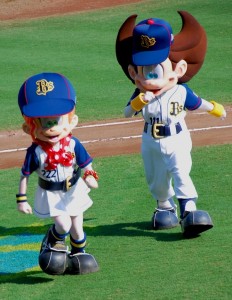
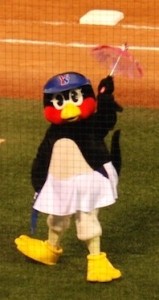
Quirky and cute, mascots play multi-faceted roles in Japan. Sure, a koala has nothing to do with a dragon – or with Japan, for that matter – but who cares? It’s all about cuteness and being a great ambassador to Japanese baseball.



I love the Carp, but I hate the Phillies and the Phanatic. Slyly is the one thing about the team that I don’t like.
All the other mascots of Japan are fine by me.
.-= Dan Mesa´s last blog ..OK Go’s New Video [ER] =-.
I have a question, what is the name of the female giabbit mascot?
Hi Christian,
There is an entire family of Giabbit mascots, three boys and two girls. The girls’ names are Bikky (she wears #777) and Chappie.